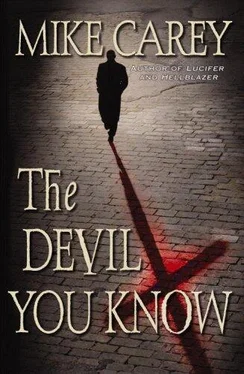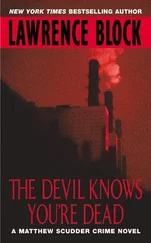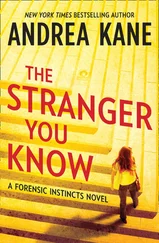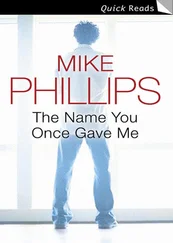But I got to the final handful at last, and I had to admit it to myself.
Nothing. Nothing at all. Not one out of all these voices speaking faintly through faded ink and yellowed paper was the voice of the Bonnington ghost.
I stared at the last clutch of documents in dumb chagrin. I’d been so certain that the thread would be there for me to pick up; the logic of it was so clear. But logic had let me down.
For a moment I thought about going back and starting again. It was a grisly prospect, but I had no other leads to pick up. If the ghost wouldn’t appear to me directly, I’d have to rely on something it had touched while it was still alive. Something that still held the imprint of its mind and personality . . .
Sometimes I miss a trick that’s so obvious, I wonder if there’s any hope for me at all. I came bolt upright in the chair, swearing at my own stupidity. Then I reached across for my coat and started to rummage in the pockets.
I didn’t have anything that the ghost had touched during its lifetime. But I had one thing that it had definitely touched since.
I pulled out the crumpled Rolodex card and held it up to examine it in the none-too-bright BS 5454 light.
I’d never tried this before, but there was no reason why it shouldn’t work. Okay, a ghost throwing its weight around isn’t quite the same proposition as a living human being touching something, but on the other hand, the trail was that much more recent. At any rate, it had to be worth a try.
Gripping the card firmly in both hands, I closed my eyes and listened with my mind. There was nothing there, but since this was the turning after the last-chance saloon, I held on. Still nothing. But after a long, strained moment, in the dead center of the nothing, a different kind of nothing opened up—the pregnant pause of dense, focused attention. It was as though I was holding a telephone receiver and I’d made a weak connection. Now someone on the other end was waiting for me to speak.
It wasn’t what I was expecting, but like I’ve always said, if life gives you lemmings, jump off a cliff.
“Hello,” I said.
No answer. I wasn’t really expecting any; I was just showing willing. But if the link that had opened up between me and the ghost wasn’t verbal, there had to be some other way to use it.
For a while I just waited, hoping that something might come into my mind without me reaching for it—some idea or emotion flowing from the ghost into me, bringing with it the pinpoint fix that I needed for the cantrip. But it seemed like the ghost was waiting, too.
I’m not sure where inspiration came from, but it came suddenly, and in spite of the sheer ludicrousness of the idea, I went for it: twenty questions. In that game, you zero in on the answer by asking broad, general questions first and then getting more and more specific. Maybe I could coax the ghost into playing a quick round with me.
I let my mind go blank, my emotions drift back down to neutral—like tapping a compass with your thumbnail to make sure the needle is floating free.
Then I started to think without thinking.
I’d like to say that this was an eastern discipline I’d picked up in an ashram in Puna, but the truth is that I’d first learned how to do it back at Alsop Comprehensive School for Boys, when I’d been introduced to acid. I used to think of it then as turning my mind into a slide projector; I’d just allow images to form behind my eyes and watch them glide past in sequence, accompanied by whatever feelings the drug high was giving me.
The beauty of it was that I didn’t have to select the images. Once I’d got the process started, they just kept coming. Actually, it was less like a slide show, more like a DVD in fast-forward, giving microsecond stills extracted from the continuous flow of memory. They weren’t random; nothing with a human mind as the operating system ever can be. But they were random enough.
Flick. Flick. Flick. No sound, no movement, no idea, no context. Just pictures, forming and fading in my mind so quickly that I could barely identify them myself in the brief time that each one was there in front of me.
Pictures of London first: Marble Arch, the Jerusalem Tavern, a back street in Soho where I’d been mugged. And parts of places: a door I didn’t recognize, with green paint peeling from bleached wood; an aerial view of two large Dumpsters with some kid sitting in between them, sniffing glue out of a Waitrose bag; the tracks of two tires on a gravel drive, like waves in a Zen garden. Then people: faces, hands, shoulders, smiling and snarling mouths, the curve of a thigh with a hand (my hand?) touching it—abstract flesh against abstract fabric.
It was working—or at least it seemed to be. The needle turned, and the ghost was the force that pulled it. I surrendered totally to that pull, letting the images that the ghost responded to linger just that bit longer in my mind, and letting each of those pull the next picture along behind it in a sort of themed cascade. The bare thigh became a man’s chest, a well-muscled arm, an erect cock, and then, inexplicably, the wheel arch of a car against a curb, with fat raindrops sitting on it. More cars, on roads, on driveways, in garages full of junk, their wheels up on makeshift brick pilings.
Roads. Cities. Houses. Rooms. Another pull from the ghost, stronger this time. It didn’t like the rooms so much, so the pictures veered back out into daylight: parks, trees, a bench in some garden, the outhouse behind a pub.
The link was flowing now with frictionless ease, and with it came a sense of being a machine in someone else’s hands. If my mind was a projector, the ghost was holding the remote and clicking me on. I let it happen: no resistance, no recoil. More pub scenes, men laughing, men puking, men talking shit with messianic fervor. Another tug: take me somewhere else.
A pavement by the Thames, just down from the Oak; postpub stations of the cross in Soho, Covent Garden, Bounds Green, Spitalfields, the Albert Dock, Porte d’Orléans, Mala Strana under Prague Castle. A huge tug on that one, and now I was seeing a bridge with snow on it, spotless except for the clear double line of my footprints; an open-air smithy in some town square I’d wandered through in northern France, the owner dipping a slender ingot of red-hot metal into black, oil-slicked water; a dirt road in some place I couldn’t put a name to, wet with new rain and a little blood.
A shed door, seen from the inside, the wood splintered and torn in vertical lines as though an animal had been clawing at it; a man’s arm, gripping a shot glass and raised in salute; a piece of paper, held up to the window of a car by a much smaller and slimmer hand, and almost transparent because of the condensation on the glass, so I could see the smudged writing on the other side: .
I wasn’t feeding into this process at all anymore, and these weren’t any memories of mine. Somewhere along the way, the ghost had taken my slides out of the projector and slipped in some of its own. I didn’t know what she was getting out of it, but for me it was working—helping me to triangulate on that weak trace and build it up into a clear sense of her that I could use in an exorcism.
Meanwhile, the images kept coming. A frozen lake with the chimneys of some kind of factory rising behind it. A room with no windows and no furniture except for a shapeless sofa covered in a bright orange fabric with suspect stains on it. The curve of a woman’s shoulders and back, the woman turned away from me, her hand up as though to hide her face from my eyes. A book with a page torn out of it, held in the heavy grip of a man’s hand, his finger tracing the tear, the herringbone tracks of a stainless-steel watchband written in red across his wrist. The edge of some kind of patterned fabric, red and yellow check. A row of plastic bottles, some empty, some full of clear liquid, standing at the foot of a wall. A man’s face, cold and hard, behind his back a snowcapped mountain, one hand raised beside his head with the fingers spread wide.
Читать дальше











